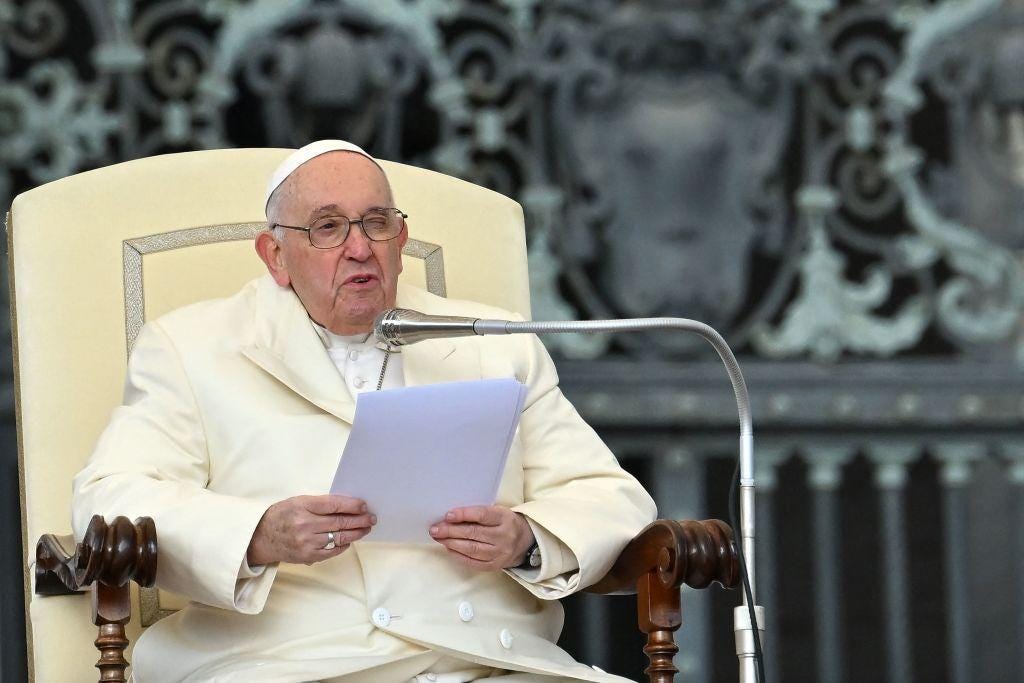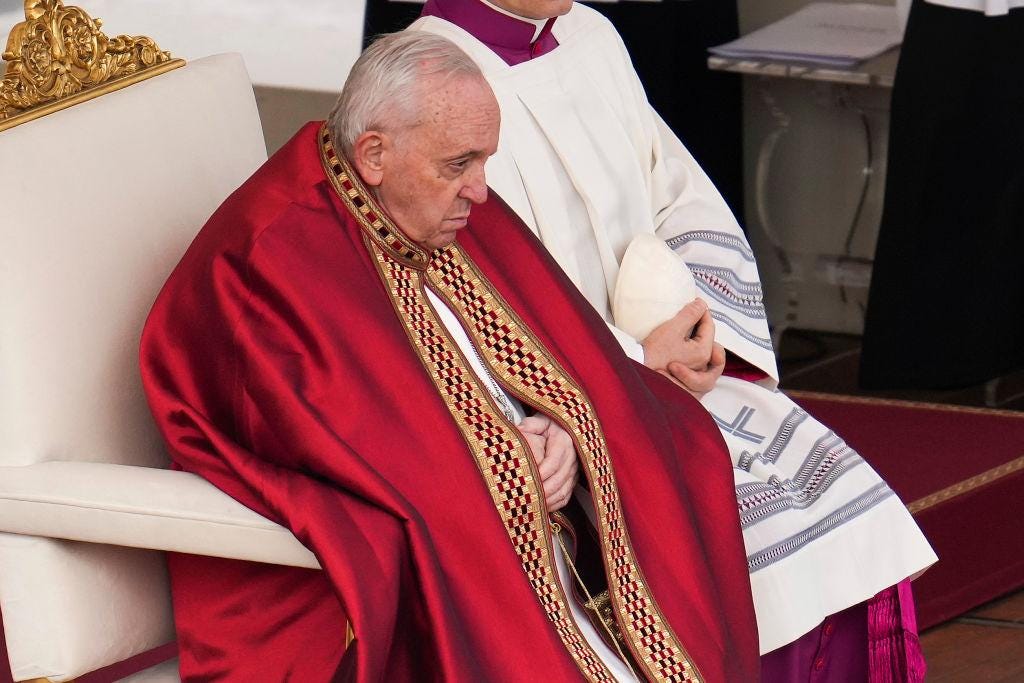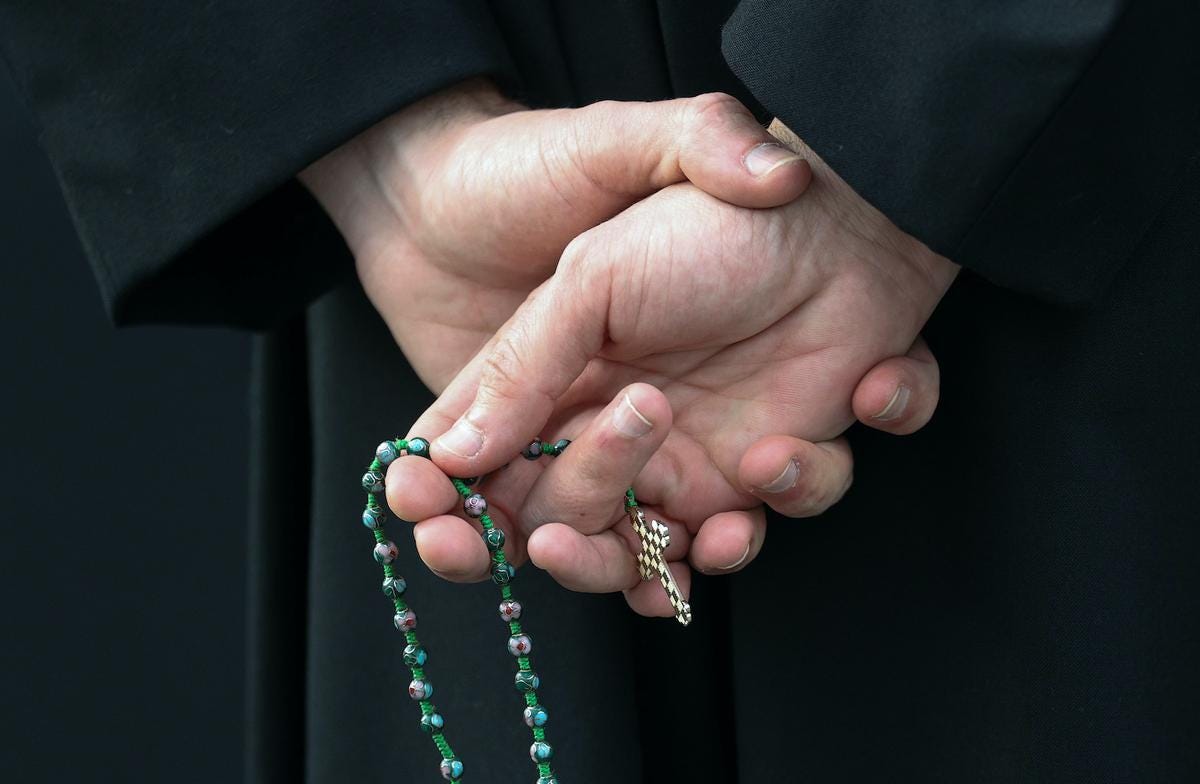Pope Says Church Leaders Can Baptize Some 'Transsexual' Catholics, Allow Some LGBT Godparents
A letter from Pope Francis provides guidelines on LGBT acceptance under church law. An American priest expects the result to be 'messy' problems for Catholics.

By Jackson Elliott 11/29/2023 Updated: 11/30/2023
In a November letter to Brazilian Bishop José Negri, Pope Francis laid out rules for transgender and LGBT engagement in the Catholic church.
Bishop Negri had asked the pontiff several questions on how the church should respond to transgender and homosexual-identifying individuals.
Under the pope's new clarifications of rules for the church, some "transsexual" Catholics are allowed to be baptized, become godparents to children, and act as witnesses at weddings.
Although the Nov. 3 letter uses "transsexual" in the original Italian, the letter—when translated into English—uses the word "transgender" in its title, according to the Rev. Brown, a Catholic priest with a background in church law.
Using a pseudonym, Father Brown agreed to speak to The Epoch Times on the condition of anonymity because it would give him more freedom to comment, he said. The Epoch Times verified his position in the church.
Consequences for Conservatives
In recent years, Church authorities have fired conservative clergy outspoken in their opposition to liberal ideology.
Recently, the pope dismissed Bishop Joseph Strickland of Tyler, Texas, from his duties. The conservative bishop had spoken against the pope's welcoming of LGBT people into the church.
The bishop also refused to cease celebrating the Catholic mass in Latin after the pope ordered restrictions on it. And he criticized the pope's closed-door debate on women in church governance.
The pope also recently punished conservative Cardinal Raymond Burke, as well, revoking his right to a subsidized Vatican apartment and salary. Francis told senior Vatican officials he made this move because Cardinal Burke was a source of "disunity" in the church.
The 86-year-old pope has a reputation for admiring progressive politics. He has signed petitions for climate change and called conservatives who oppose his political positions "backward."
The bishop also refused to cease celebrating the Catholic mass in Latin after the pope ordered restrictions on it. And he criticized the pope's closed-door debate on women in church governance.
The pope also recently punished conservative Cardinal Raymond Burke, as well, revoking his right to a subsidized Vatican apartment and salary. Francis told senior Vatican officials he made this move because Cardinal Burke was a source of "disunity" in the church.
The 86-year-old pope has a reputation for admiring progressive politics. He has signed petitions for climate change and called conservatives who oppose his political positions "backward."
In November, the pontiff welcomed more than 150 men who identify as women as his guests at a luncheon in the Vatican auditorium as part of the Catholic World Day of the Poor. Many in the group of transgender-identifying guests work as prostitutes.
The pope has reached out to them before.
Advertisement - Story continues below
AD
When pandemic lockdowns put a halt to the sex trade, Pope Francis invited the transgender-identifying prostitutes to attend his weekly general audiences, and he offered them money, medicine, shampoo, and vaccines.
The policies outlined in the pope's recent letter to the bishop take steps to support the LGBT community further.
But they don't change church rules, said Father Brown. Instead, the pope's letter clarifies how priests govern their areas of responsibility within existing church rules, he said.
"Within the rules and the law of the church, there's certain guidelines that must be followed for those performing a function within the church or undergoing a role, or even for those receiving a sacrament," Father Brown said. "But they're written in such a way where there is room for interpretation, and they're not overly restrictive."
The pope's letter tells priests that—within the law, as now written—there is room for transgender baptism, transgender godparents, and transgender wedding witnesses.
But the clarifications come with caveats.
Transgender Catholics can be baptized only in cases that don't create "public scandal," and they can become godparents only under "certain conditions."
Homosexuals can have their children baptized if there is a "well-founded hope" that the children will be raised Catholic. And same-sex couples can be godparents, the pope wrote, but these situations must be "wisely considered."
The pope's letter offers unqualified support to transgender-identifying and homosexual-identifying individuals who want to serve as witnesses for the sacrament of marriage in the church.
But in the case of serving as godparents, transgender-identifying people shouldn't be allowed to serve in that role "if there is a risk of scandal, undue legitimation, or disorientation in the educational sphere of the ecclesial community," the pope wrote in the letter.
"These are not just wide, broad, nameless, faceless groups of people. These are people with histories, with futures, with souls, with bodies, with minds and hearts, that God demands we care for in some way," Father Brown said, saying that he believes the pope's intention is to "transcend it, to then really care for the individuals that are being discussed politically."
This explains the careful wording of the letter, Father Brown said.
About baptism, the pope wrote, "A transsexual—who has also undergone hormonal treatment and sex reassignment surgery—can receive baptism, under the same conditions as other believers, if there are no situations in which there is a risk of generating public scandal or disorientation in the faithful."
He wrote, "In the case of children or adolescents with transsexual problems, if well prepared and willing, they can receive baptism."
For Catholics, baptism means initiation into the church and forgiveness of the baptized person's sins, according to the Catholic catechism.
However, the pope's letter qualifies its approval for transgender baptism by saying that, even that sacrament—without the turning away from sin—does not provide forgiveness from God.
True repentance is the key, Father Brown said.
Local Decisions on Transgenderism
The wording of the letter puts decision-making power into the hands of local priests to decide how to handle issues within their own congregations, Father Brown said.
Considering "public scandal" is rare when deeming whether it's appropriate to administer a sacrament, such as baptism, he said. And whether something is a "scandal" depends very much on local culture.
"What is scandalous in one neighborhood or one parish can be completely normal in another parish," he said. "There is a risk that if this is misinterpreted and misapplied, it could lead to a certain relativization of the dispensation or administration of the sacraments."
It's likely that the pope's letter means that in largely liberal locales, such as New York or San Francisco, priests now will baptize transgender-identifying individuals, Father Brown said.
But in conservative places, such as Kenya, priests likely will not allow baptism for transgender-identifying individuals, because, in that culture, it could cause "scandal," as the pope cautioned against in his letter, Father Brown said.
The pope appears to intend this divergence in policy, Father Brown said, even though Francis has condemned radical gender ideology in the past.
The pope wrote in 2015 that men and women must embrace the way God created them as male and female.
"We are called to protect our humanity, and this means, in the first place, accepting it and respecting it as it was created."
Still, Father Brown said, when it comes to LGBT people, the pope "loves them all and cares for them all in whatever way that we can. And he doesn't let them get dehumanized by the political machine."
Father Brown said a close friend of the pope has told him that Francis has "deep concern for transgenderism and what he called 'gender theory.'"
Clarifying Godparent Eligibility
For Catholics, a godparent is an adult selected by the parents of a child being baptized to help lead the child in religious faith. These individuals must be Catholics currently leading a "life of faith," according to Catholic religious law.
Advertisement - Story continues below
AD
The pope's letter reiterates that anyone living "a life in conformity with the faith" can be a godparent.
But, the pontiff wrote, "the case is different" for two same-sex attracted people living together in a marriage-style relationship.
The letter doesn't specify exactly how things will be different for same-sex couples. The pope states in the letter that it is "necessary to consider the real value that the ecclesial community gives to the tasks of godfathers and godmothers."
Catholic law says that homosexual acts are morally wrong, according to the United States Council of Catholic Bishops (USCCB).
The Epoch Times contacted the Vatican but received no comment by publication time.
Jackson Elliott reports on family-related issues and small-town America for The Epoch Times. His current focus centers around parental rights in education, as well as the impact of progressive ideology in curricula and transgenderism in youth. He can be reached at: jackson.elliott@epochtimes.us
https://www.theepochtimes.com/world/pope-says-church-leaders-can-baptize-some-transsexual-catholics-allow-some-lgbt-godparents-5527282?ea_src=frontpage&ea_med=top-news-social-issues-0-large-0








